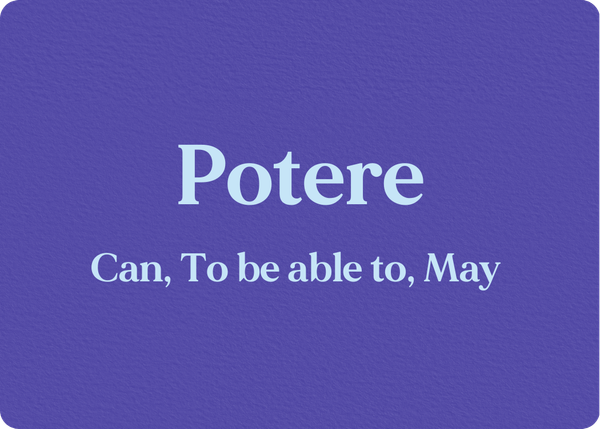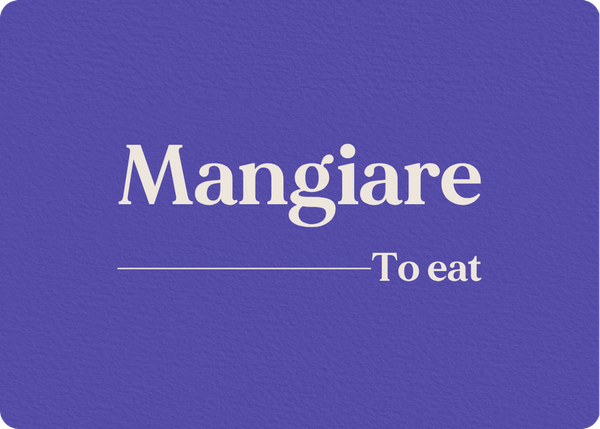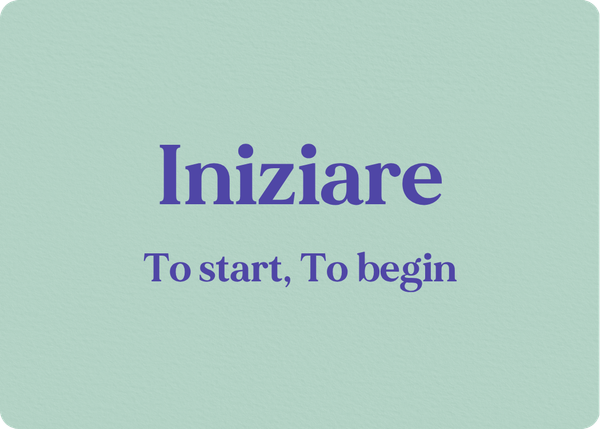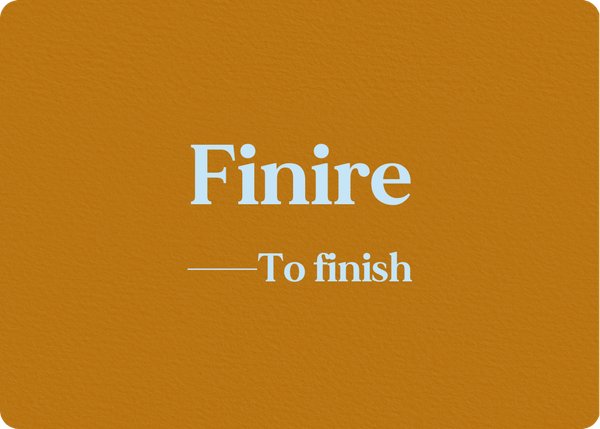What is Potere?
Potere is an irregular Italian modal verb meaning "can", "to be able to", or "may". It belongs to the second conjugation (-ERE verbs) but follows irregular patterns in some tenses. This essential modal verb is crucial for expressing ability, possibility, permission, and potential in Italian conversation and is one of the most frequently used verbs in the language.
Key Features of Potere:
- Type: Irregular second conjugation verb (-ERE).
- Meaning: Can, to be able to, may, might
- Irregularities: Present tense (posso, etc.), future (potrò), present subjunctive (possa), conditional (potrei)
- Auxiliary verb: The verb potere takes the auxiliary of the verb that follows it:
- Avere - main form of compound tenses (Ho potuto - I was able to)
- Avere - when followed by verbs that use avere as auxiliary verb (Ho potuto mangiare - I was able to eat)
- Essere - when followed by verbs that use essere as auxiliary verb (Sono potuto andare - I was able to go) - Past participle: Potuto
Note on reflexive verbs: If the pronoun precedes the infinitive, use essere (Mi sono potuto cambiare - I was able to change myself), but if the pronoun follows the infinitive, use avere (Ho potuto cambiarmi - I was able to change myself).
Indicativo – Indicative Mood
Presente (Present Tense)
| Person | Conjugation |
|---|---|
| io | posso |
| tu | puoi |
| lui/lei | può |
| noi | possiamo |
| voi | potete |
| loro | possono |
Example:
Posso aiutarti con i compiti?
Can I help you with your homework?
Passato Prossimo (Present Perfect)
| Person | Conjugation |
|---|---|
| io | ho potuto |
| tu | hai potuto |
| lui/lei | ha potuto |
| noi | abbiamo potuto |
| voi | avete potuto |
| loro | hanno potuto |
Example:
Finalmente Roberto ha potuto comprare una macchina nuova.
Roberto was finally able to buy a new car.
Imperfetto (Imperfect)
| Person | Conjugation |
|---|---|
| io | potevo |
| tu | potevi |
| lui/lei | poteva |
| noi | potevamo |
| voi | potevate |
| loro | potevano |
Example:
Da ragazzo potevo fare mille cose senza stancarmi.
When I was younger, I could do a thousand things without getting tired.
Trapassato Prossimo (Past Perfect)
| Person | Conjugation |
|---|---|
| io | avevo potuto |
| tu | avevi potuto |
| lui/lei | aveva potuto |
| noi | avevamo potuto |
| voi | avevate potuto |
| loro | avevano potuto |
Example:
Avevo potuto aiutare mia sorella con il trasloco prima di partire.
I had been able to help my sister with the move before leaving.
Passato Remoto (Simple Past)
| Person | Conjugation |
|---|---|
| io | potei |
| tu | potesti |
| lui/lei | poté |
| noi | potemmo |
| voi | poteste |
| loro | poterono |
Example:
Grazie al suo impegno, poté salvare l’azienda dalla crisi.
Thanks to his/her commitment, he/she was able to save the company from the crisis.
Trapassato Remoto (Past Anterior)
| Person | Conjugation |
|---|---|
| io | ebbi potuto |
| tu | avesti potuto |
| lui/lei | ebbe potuto |
| noi | avemmo potuto |
| voi | aveste potuto |
| loro | ebbero potuto |
Example:
Dopo che ebbi potuto chiarire la mia posizione, mi sentii sollevato.
After I had been able to clarify my position, I felt relieved.
Futuro Semplice (Simple Future)
| Person | Conjugation |
|---|---|
| io | potrò |
| tu | potrai |
| lui/lei | potrà |
| noi | potremo |
| voi | potrete |
| loro | potranno |
Example:
Domani non potrò partecipare al convegno.
Tomorrow I won’t be able to attend the conference.
Futuro Anteriore (Future Perfect)
| Person | Conjugation |
|---|---|
| io | avrò potuto |
| tu | avrai potuto |
| lui/lei | avrà potuto |
| noi | avremo potuto |
| voi | avrete potuto |
| loro | avranno potuto |
Example:
Come avrai potuto leggere, l’azienda si occupa di marketing digitale.
As you may have read, the company deals with digital marketing.
Congiuntivo – Subjunctive Mood
Presente (Present Subjunctive)
| Person | Conjugation |
|---|---|
| che io | possa |
| che tu | possa |
| che lui/lei | possa |
| che noi | possiamo |
| che voi | possiate |
| che loro | possano |
Example:
Spero che tu possa venire alla festa sabato!
I hope you can come to the party on Saturday!
Passato (Past Subjunctive)
| Person | Conjugation |
|---|---|
| che io | abbia potuto |
| che tu | abbia potuto |
| che lui/lei | abbia potuto |
| che noi | abbiamo potuto |
| che voi | abbiate potuto |
| che loro | abbiano potuto |
Example:
Ci dispiace che non abbiate potuto visitare la mostra.
We’re sorry that you weren’t able to visit the exhibition.
Imperfetto (Imperfect Subjunctive)
| Person | Conjugation |
|---|---|
| che io | potessi |
| che tu | potessi |
| che lui/lei | potesse |
| che noi | potessimo |
| che voi | poteste |
| che loro | potessero |
Example:
Dubitavo che loro potessero completare il lavoro in tempo.
I doubted that they could finish the work on time.
Trapassato (Past Perfect Subjunctive)
| Person | Conjugation |
|---|---|
| che io | avessi potuto |
| che tu | avessi potuto |
| che lui/lei | avesse potuto |
| che noi | avessimo potuto |
| che voi | aveste potuto |
| che loro | avessero potuto |
Example:
Se avessi potuto, avrei viaggiato di più da giovane.
If I had been able to, I would have traveled more when I was young.
Condizionale – Conditional Mood
Presente (Present Conditional)
| Person | Conjugation |
|---|---|
| io | potrei |
| tu | potresti |
| lui/lei | potrebbe |
| noi | potremmo |
| voi | potreste |
| loro | potrebbero |
Example:
Eleonora potrebbe aiutarci con la traduzione dell'articolo, perché conosce bene l’inglese.
Eleonora could help us with the translation of the article because she speaks English well.
Passato (Past Conditional)
| Person | Conjugation |
|---|---|
| io | avrei potuto |
| tu | avresti potuto |
| lui/lei | avrebbe potuto |
| noi | avremmo potuto |
| voi | avreste potuto |
| loro | avrebbero potuto |
Example:
Simona avrebbe potuto vincere la gara se si fosse allenata di più.
Simona could have won the race if she had trained more.
Imperativo (Imperative)
The imperative of "potere" is missing in Italian.
Indefinite Moods
Infinito (Infinitive)
- Presente (Present): potere (to be able to)
- Passato (Past): avere potuto (to have been able to)
Examples:
È importante poter(e) contare sui propri amici.
It’s important to be able to rely on your friends.
Aver(e) potuto partecipare al congresso scientifico è stato un onore.
To have been able to participate in the scientific congress was an honor.
Participio (Participle)
- Presente (Present): potente (powerful) - used as adjective, not verbal form
- Passato (Past): potuto (been able to)
È un uomo potente e molto rispettato.
He is a powerful and highly respected man.
Non ho potuto rispondere alla tua chiamata.
I couldn’t answer your call.
Gerundio (Gerund)
- Presente (Present): potendo (being able to)
- Passato (Past): avendo potuto (having been able to)
Potendo scegliere, vivrei al mare.
Being able to choose, I would live by the sea.
Avendo potuto studiare all’estero, ho imparato un'altra lingua.
Having gone by car, we arrived much earlier.
The verb Potere at a glance: Key tenses you need
| Present | Present Perfect | Imperfect | Present Subjunctive | Imperfect Subjunctive | Present Conditional |
|---|---|---|---|---|---|
| io posso | io ho potuto | io potevo | che io possa | che io potessi | io potrei |
| tu puoi | tu hai potuto | tu potevi | che tu possa | che tu potessi | tu potresti |
| lui/lei può | lui/lei ha potuto | lui/lei poteva | che lui/lei possa | che lui/lei potesse | lui/lei potrebbe |
| noi possiamo | noi abbiamo potuto | noi potevamo | che noi possiamo | che noi potessimo | noi potremmo |
| voi potete | voi avete potuto | voi potevate | che voi possiate | che voi poteste | voi potreste |
| loro possono | loro hanno potuto | loro potevano | che loro possano | che loro potessero | loro potrebbero |
Conclusion
Mastering the conjugation of "potere" is essential for expressing ability, possibility, and permission in Italian. This irregular modal verb requires careful attention to its unique forms, particularly the irregular present tense (posso, etc.) and future/conditional stem (potr-).
Remember the key points:
- Uses "avere" as auxiliary verb in compound tenses when used alone
- As modal verb, takes the auxiliary of the following verb (avere with avere-verbs, essere with essere-verbs)
- Irregular in some tenses
- Past participle is "potuto"
- Essential for expressing ability, possibility, and permission
Keep practicing with real sentences and you'll master this fundamental Italian modal verb!





